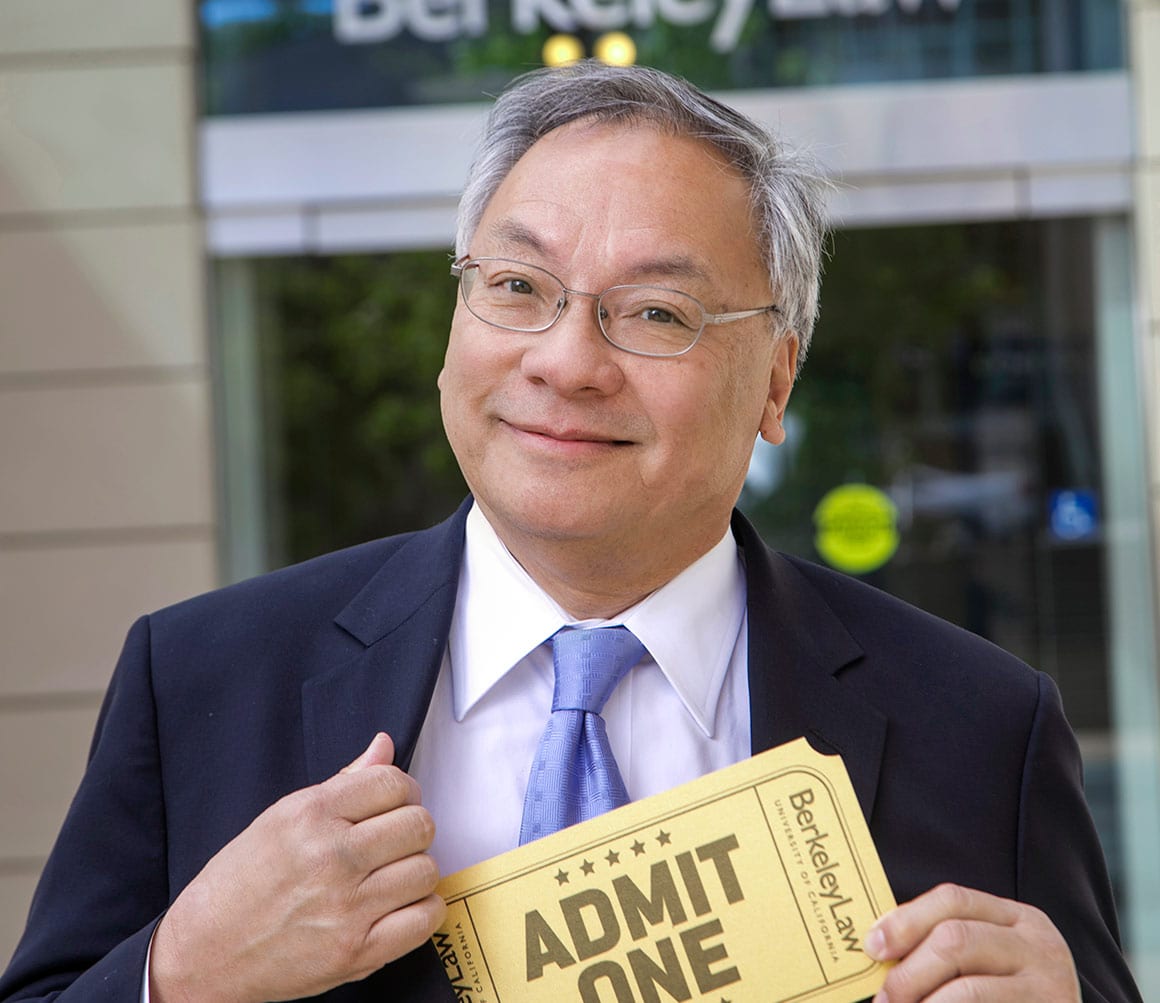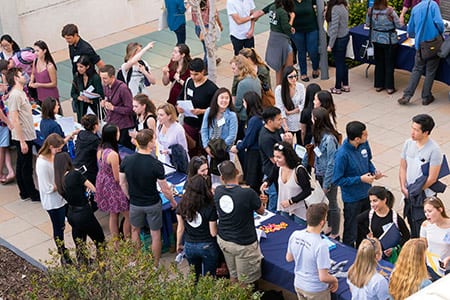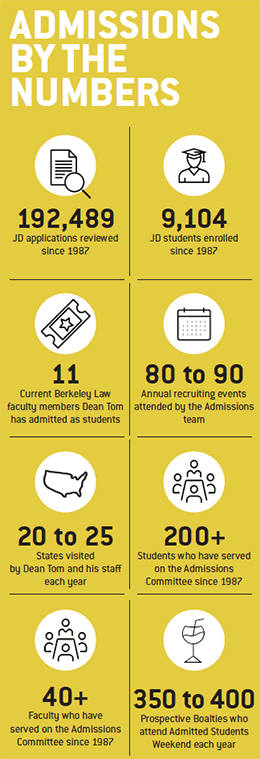
Retiring in December, Edward Tom reflects on a joyful 30-year ride as Dean of Admissions.
Interviewed by Andrew Cohen
Edward Tom has seen it all at Berkeley Law. Parachute pants and mullets. Scrunchies and overalls. Man buns and skinny jeans.
While the styles parading through Boalt Hall over the past 30 years have changed, one thing has remained constant: Tom’s position as Dean of Admissions.
Hundreds of faculty members have come and gone, and Melissa Murray is Tom’s eighth dean. Legal education has experienced huge changes, and state support of the school plummeted from about 80 percent of its operating budget to just 13 percent last fiscal year. Two decades ago, California’s Proposition 209 eliminated affirmative action in admissions decisions.
At every step, Tom’s diligence and attention to detail ensured that Berkeley shined as one of the nation’s extraordinary law schools. What’s more, his team has deftly nourished a welcoming atmosphere by admitting a diverse mix of students who value collaboration and collegiality.
After creating indelible memories for thousands of admits, Tom recently announced—to a resounding chorus of “Nooooo!”—that he will retire at the end of 2017. He recently took some time to reflect on his three-decade tenure with senior communications writer and Transcript managing editor Andrew Cohen.
Andrew Cohen: What sparked your interest in admissions, and what about the work kept you so enthusiastically engaged?
Ed Tom: My first job after college was as a crisis interventionist for high school youth in Monterey County. After five years, I was drained and decided to return to Berkeley to look into another degree. I also needed a job. Serendipity intervened and the Boalt Hall Admissions Office hired me, mainly based on my counseling experience. My first title was Administrative Assistant II, and my first task was to staple small envelopes inside each of 4,000 application folders. Of course, I was hooked and never looked back.
My work has been extremely rewarding since then. I encounter interesting people every day. I get to work at my alma mater, and I live in a beautiful area of the country. Most of all, few jobs provide the chance to recognize potential in people and then to watch them turn that potential into their own reality.
Given all that, why retire?
After 30 years, I think it’s time for someone else to be given the chance to do what I do. Serving as Berkeley Law’s Admissions Dean truly has been the joy of my life. I’ve been very fortunate for the responsibility and for having worked with such great deans and faculty. But now I’m ready to do other things.
What’s on your list?
I hope to have more time to play and collect guitars and to learn how to play jazz. I want to learn tai chi. My wife and I may do some traveling, and maybe down the road I’ll do some consulting. But most of all, I want to be able to read for fun again. Often, my eyes are just too weary from reading applications. I have a big library at home of books that are awaiting my attention.
Speaking of your guitar prowess, Interim Dean Melissa Murray rapped on a recent school video and Human Resources Director Sheri Showalter sings in a Pink Floyd cover band. Any collaboration on the horizon?
Unlikely, but one never knows. Most days, I’m content to just crank my amp up when I get home and play the blues on my own.
What’s the biggest misconception about law school admissions?
That our admission process is only about numbers. Yes, LSAT and GPA are substantial factors in our review, but they certainly don’t measure all the many traits and strengths that are important both for pedagogic reasons and in the profession.
You’ve said putting together an entering class is a bit like organizing a choir. How so?
One of the important factors that contributes to a Berkeley Law education is the caliber of the conversations that comprise our classroom experiences. Those conversations depend on a variety and diversity of voices to occupy the seats. I often suggest to prospective applicants that they try not to view me as the Dean of Admissions, but as a choir director whose goal is to rebuild a choir every year with each member who can offer a different, unique voice.
Berkeley Law is widely praised for its welcoming culture compared with other top schools. How does your team help cultivate that?
I believe many people choose to study at Berkeley Law because of our reputation for offering a challenging curriculum within a nurturing environment. Our reputation, which has grown over the years and is now known and acclaimed within the prelaw community, begins with how we treat our applicants and new admits. Even though we’re the most selective public law school in the country, it’s important for us not to be arrogant about it. In fact, because we have to say “no” so many more times than we can say “yes,” I believe we have to try even harder to be fair, compassionate, and transparent.
It seems GPA, LSAT score, and personal statement/letters of recommendations are considered the holy trinity of law school admissions. Do you value them equally?
Yes, I view them as equal tools within a holistic review process. Each tool has a use, but no one tool is necessarily more valuable than another for building a class. Is there a correlation between “high numbers” and the traits that contribute to good law students and lawyers? Perhaps, but I have qualms about consistent reliability. A well-written personal statement, interesting résumé, and strong recommendations provide insight into an applicant’s potential, too. We don’t admit just numbers. We try to admit human beings.
What percentage of accepted applicants typically enroll at Berkeley?
This number has varied from year to year, but over the past two decades it’s been about one-third. How large is the waitlist every year, and how many of those wait-listed do you usually admit? The waitlist size and number of people admitted from the waitlist varies a lot from year to year. On average, we waitlist about 300 to 350 people. In most years, the number admitted from the list is zero to fewer than 10. It depends on our yield rate and what’s happening at other schools.

Do you remember the first student you ever admitted?
Unfortunately, I don’t. However, I’m still in touch with the first person I admitted from the waitlist.
How has the student body changed over the years?
They all look so much younger now.
Law school tuition has risen sharply since 2008, and the legal marketplace has become less stable. How do you address concerns about student loans or the current value of a law degree?
We used to get the bulk of our operating funds from the state. Relatively speaking, that resource has disappeared and tuition and fees have increased. Students are more aware of the cost-benefit analysis than when I started. And of course they want to attend a school where they will receive a high-quality education and have great employment and clerkship opportunities afterward.
I know we’re competitive with the other top schools on most levels except one, which is scholarship availability. We simply don’t have the deep pockets that the top privates have. What we do have are the intangibles: location, a supportive learning ambience, great faculty, numerous clinics and centers, a worldwide network, and so on. Nevertheless, in the end, money talks and it’s disheartening to lose a wonderful admit for lack of a competitive scholarship offer.
How did the recent national decline in law school applications affect the quality of Berkeley Law applicants?
Fortunately, the decline didn’t seem to impact our applicant pool quality as much as feared. We still receive many more great applications than we can accommodate. That gives me the luxury to focus more on recruiting our admits to choose us over another school rather than on generating applications. Of course, that’s important as well.
What’s the biggest change you’ve seen in the admissions process during your 30 years here?
The biggest changes are the result of technological advancement. Email, websites, online applications and review, electronic fund transfers, to name a few, have made a huge impact on streamlining our work. We no longer have little envelopes stapled into manila files. In fact, we no longer have manila files!
What’s easier about your job now than when you started, and what has become harder?
Creating an application file is much easier now than when I started. We no longer have to file hundreds of hard-copy documents manually. The application process is entirely electronic now, so no more paper cuts.
What has become harder is wooing top candidates to choose us over another top school. Our relative cost advantage has disappeared. Every year there are so many admitted students who tell me they would attend Berkeley but for another school’s more attractive financial aid offer.
When was the most exciting time to be at Berkeley?
The most exciting time for me is every opening day of orientation when I greet the new entering class. To meet in person the people you’ve only known on a computer screen for so many months is such an extraordinary experience. And because I’ve been delivering the same welcome speech for many years, I also get a charge whenever I encounter alumni who remind me of their first day at the school or when I phoned to let them know that they had been admitted.
What was the most difficult time?
Definitely around the passage of Prop 209 and its immediate aftermath. It seemed like my office was in the spotlight all the time and everything we did was the subject of a news article or broadcast. The aftermath required us to transform our admission process and messaging, too.
How diverse are your entering classes now compared with before Prop 209, and how challenging is it to maintain that diversity?
Diversity in the class has slowly climbed back, and we work hard to ensure that our classes are filled with as many different voices as possible. We continue to work on our outreach and recruitment campaigns. We adopted a holistic review process that seeks to identify a wide range of potentials. I think the process is sound, but its effect is slow, unpredictable, and subtle. Diversity, in all of its shapes and forms, is a fragile thing and always changes from class to class.
When you first started, it must have been difficult choosing one student over another. Is that hard now?
Yes, it’s still hard and more labor-intensive. When I first began many years ago, the average applicant pool size was around 3,500. Today, it’s around 5,500. However, our class size has remained the same at 270 to 290.
Have you ever regretted not admitting a particular applicant?
I deal with heartache almost every day because there are so many worthy applicants but not enough room to admit them all. But my biggest heartaches happen when someone I’ve admitted decides to enroll elsewhere. It’s similar to making a love connection, but then getting jilted.
What’s the best advice you can offer someone applying to Berkeley Law?
Going to law school can never be a default decision because there’s nothing better to do. If you’re not sure, I advise taking care of any unfinished business in your life. Have you ever dreamed of learning the tango in Argentina? Working on a ranch? Hiking through Cambodia? Whatever it is, go do that first before coming to law school because once you come to us, there won’t be time for quite a while.



